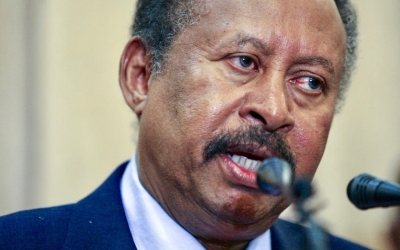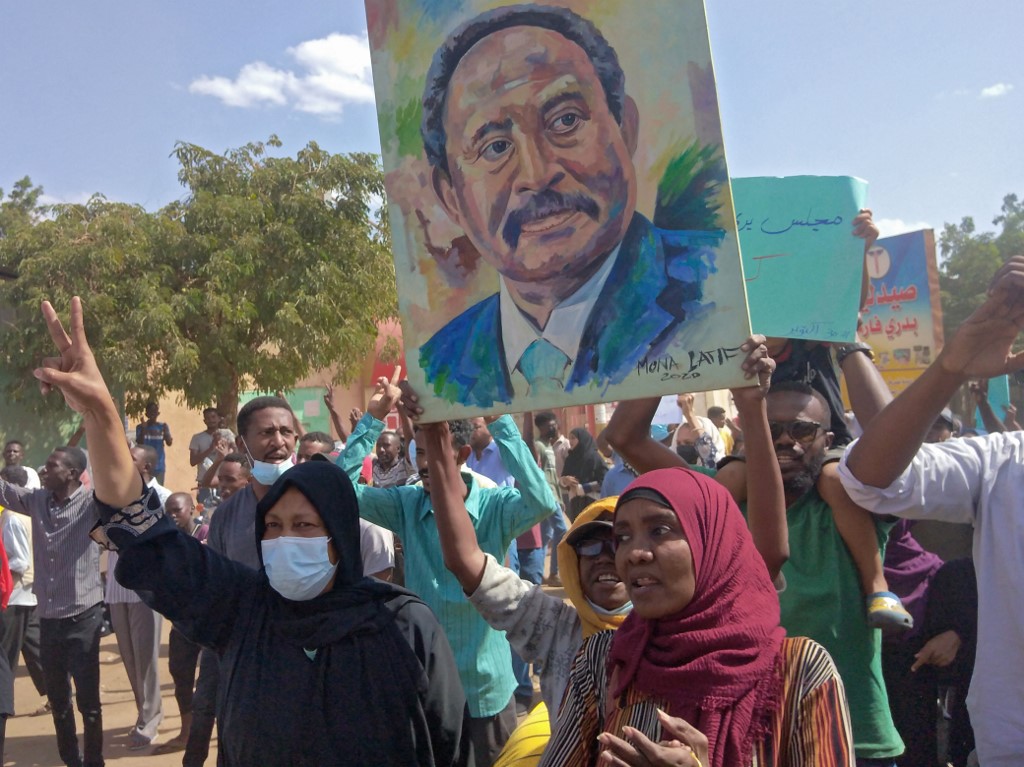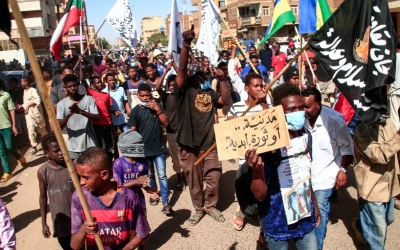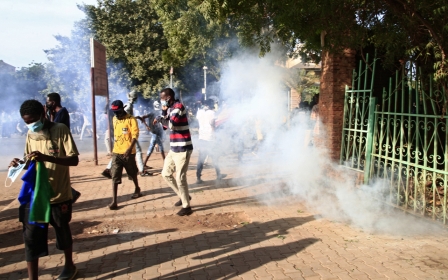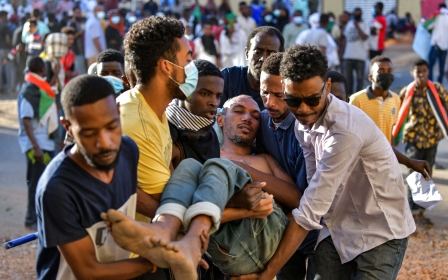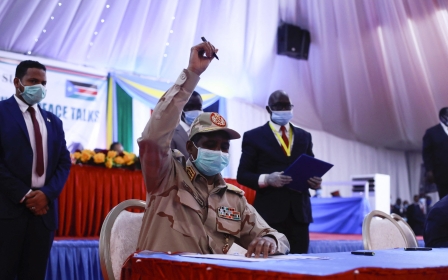Hamdok's resignation leaves Sudan in the military's hands. Sanctions may be next
Abdalla Hamdok’s resignation had been telegraphed for days.
The prime minister, who was detained and removed by the military in an October coup only to sign a deal with the putschists weeks later, had been pleaded with by domestic, regional and international powers to stay in his post in order to keep the transitional period and Sudan’s democratic transformation on track.
Yet Hamdok’s reinstatement seemed to do little to change the military’s path. Protests against the military’s takeover continued, as did the deadly crackdowns on them.
Eventually, on Sunday night, the prime minister stepped down after two years in office. The news was met with jubilation by pro-democracy protesters, while the resistance committees that drove the 2019 revolution that put Hamdok in power in the first place promised they will continue to fight against the military takeover.
Others, however, fear Sudan is now completely in the hands of the military.
Joy and fury
In his resignation speech, Hamdok acknowledged the transition to democracy following the fall of longtime autocrat Omar al-Bashir had been a failure. He blamed both the military and civilian elements of the power-sharing transitional system for the breakdown of the partnership.
“It failed to continue with the same harmony as when it begun,” Hamdok said in a televised address.
He further warned that the country may fall into chaos. “I tried my best to lead our country to avoid the sliding towards a disaster and now it is currently passing through a serious turn that may threaten its existence,” he said.
“I said to our military, including the national army, Rapid Support Forces [paramilitary], police and intelligence, that the nation is the highest sovereign power and the military belongs to it, working under the command of the nation, to secure its life, unity and territories.”
There have been mixed responses. Some had grown to see him as the civilian face of the coup, a collaborator with military leaders Abdel-Fattah al-Burhan and Mohammed “Hemeti” Daglo, and were glad to see him go; others believed he was a loss for Sudan’s democratic hopes.
Ali Nasser, a resistance committee member, said that the resignation made no difference on the ground.
“We have nothing to do with this resignation, as Hamdok has already legitimised the coup through his deal with the army on 21 November. So we are against the entire regime of the coup and we will continue resisting it,” he said.
“I see that our efforts to defeat the coup are going well, beginning with Hamdok, and we will end this path by ousting Burhan and Hemeti soon.”
In the end, neither the civilian politicians led by Hamdok nor the military properly represented the Sudanese people, and that’s why their agreement failed, according to Samahir El Mubarak, a leading member of the Sudanese Professional Association (SPA) revolutionary group.
“The Sudanese revolution is about the concepts of the revolution, it’s not about a person as such, a saviour or symbol. But it’s about the values of freedom, peace and justice, and the entire democratic transition,” she told Middle East Eye.
“That agreement has definitely legitimised the military coup. Putting a civilian face in front of the military coup doesn’t change the fact that it’s a military coup.”
Military power
The post-Bashir transition crafted in August 2019 saw a military-civilian “Sovereignty Council” rule alongside a government led by Hamdok. Together they would prepare Sudan for free elections in November 2022.
Burhan has promised future elections are still on track. Yet the Forces of Freedom and Change (FFC), a civilian revolutionary grouping that led the anti-Bashir protests and formed part of the subsequent ruling coalition, warned the country is now heading for full military rule. It called for Burhan to step down as well as Hamdok.
Ibrahim al-Amin, a leading FFC member, said Sudan is at a crossroads, and believes responsibility for its fate lies more with the military than the civilians.
'The Sudanese revolution is about the concepts of the revolution, it’s not about a person as such, a saviour or symbol'
- Samahir Mubarak, leading member of the SPA
“This resignation is because of the military interests and a greedy power-grab, but we can’t say that there weren't mistakes by the civilians as well. I think the military have to consider this resignation seriously, it means that the partnership has failed and the constitutional declaration too,” he said.
“However, this doesn’t mean that this resignation is supposed to be taken by the army as an opportunity to take over or grab the power.”
Amjed Farid, former deputy chief of staff at Hamdok’s office, believes the resignation has, alongside the 56 people killed by crackdowns since October, piled pressure on the military.
“The military regime is collapsing. But we have to stop and block all the ways for any compromise with the military under any excuses,” he said.
Sudanese have protested in their thousands ever since Hamdok and other officials were detained in October, and continually been met with violence. Yet international pressure has not been as intense as domestic critics of the military would like.
UN representative to Sudan Volker Perthes said in a statement he regretted Hamdok’s decision. In a statement, he said he was “deeply concerned by the number of civilians killed and injured in the context of the ongoing protests”.
International sanctions
Further international pressure may be coming however.
Cameron Hudson, a former US diplomat and expert on Sudan, said the military’s coup and failure to make its November pact with Hamdok work has paved the way for dictatorship, and likely international sanctions too.
“Hamdok’s departure is the last nail in the coffin of the transition. The first was the military coup. There is now no pretence that this is anything more than a military dictatorship,” he said.
“There is nothing standing in the way of western sanctions against the military for the coup and for their killing of nearly five dozen unarmed protesters,” he added.
“Out of respect, I think, for Hamdok and the political deal he stuck with the military on 21 November, Washington has held back on punitive measures in a bid to let that political agreement play out. Now that it has not, it opens up new policy tools the West can use to put pressure on the military.”
On a domestic level, the constitutional declaration that Sudan has been operating under since Bashir is now totally unfit for purpose, according to an international legal expert.
“As the army excluded the other [civilian] partner in the power-sharing system and the PM himself has resigned, the rescue of the constitutional declaration from collapse becomes impossible,” the expert said, speaking anonymously as they were not authorised to speak to the media.
“The military may also call for dialogue in order to make a kind of consensus that can help them to form another government with the presence of civilians, in order to help ease international sanctions. However, the legal framework is also important after the collapse of the constitutional declaration.”
This article is available in French on Middle East Eye French edition.
Middle East Eye propose une couverture et une analyse indépendantes et incomparables du Moyen-Orient, de l’Afrique du Nord et d’autres régions du monde. Pour en savoir plus sur la reprise de ce contenu et les frais qui s’appliquent, veuillez remplir ce formulaire [en anglais]. Pour en savoir plus sur MEE, cliquez ici [en anglais].


